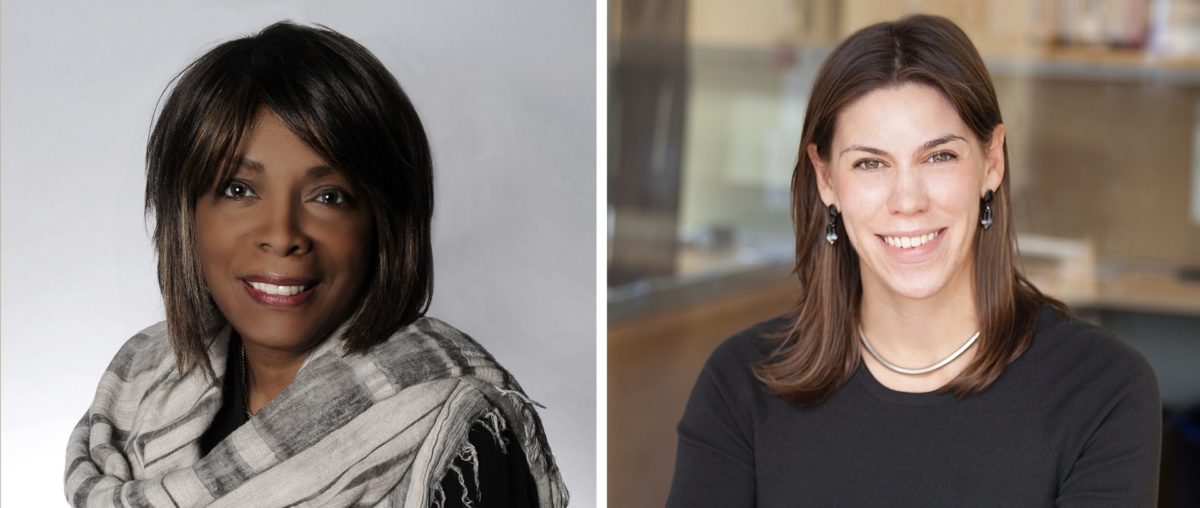
U.S. Energy Foundation recently welcomed new leadership to its board of directors: Rose McKinney-James has been named board chair and Nicole Systrom is vice chair. Their election to these roles coincides with a landmark update to the organization’s mission, vision, and values.
Rose is the Managing Principal of Energy Works LLC and McKinney-James & Associates, providing business-consulting services and advocacy in public affairs, energy policy, strategy, and economic and sustainable development. Nicole is founder of the Sutro Energy Group, which partners with philanthropists, investors, and entrepreneurs on innovative solutions for climate change.
In a recent Energy Foundation town hall, Rose and Nicole took questions from CEO Jason Mark and staff. Below is an edited version of the session and their comments.
Please say a few words about your background.
ROSE: I grew up in Detroit, studied in Washington, DC, and I’m now joining you from Las Vegas. I’ve lived in Nevada for a long, long time. I’ve dedicated most of my career to advancing clean energy, and I’m excited to think together about our amazing future.
NICOLE: Like Rose, I grew up in the Midwest, outside of Chicago, but have lived in the Bay Area for almost 20 years. My very first job out of college, I was a fundraiser for a nonprofit so I’ve been working with philanthropy and foundations most of my career. I’m excited to keep helping Energy Foundation stay healthy and grow so we can keep doing our great work in this crucial time.
What changes have you seen since starting your journey in the clean energy space?
ROSE: What’s changed? I would say everything. The economics have changed, and the technology has changed. I underscore those two things because when I started, they were huge hurdles in terms of engaging decision-makers around advancing policy that made sense in that space. The other thing is the nature of the engagement. I think Energy Foundation should be given a great deal of credit for coming up with strategies that enhance that engagement over time. We now have a framework of policies in place, and we have engagement from all aspects of the important stakeholder community. But I think the most important thing is, there is now a greater urgency and an understanding of why the work that we’ve undertaken is so important.
NICOLE: My background is more in the NGO/philanthropy arena, and many of you know that I focus pretty strongly on climate tech innovation, so that’s the context of my comments. When I started in this work, there were different verticals within climate change, like water and agriculture and energy. What I’ve seen over time is a much deeper understanding within the movement about how all those things mesh together—and also that climate change is about people. Before, if you were talking about climate change, it was represented by windmills and polar bears. In the last five years or so, there’s been a very welcome recognition that this is about people being able to live safely in their homes and have food and be healthy and have clean energy. We’re much better for that—the focus on people.
What was your first introduction to the Energy Foundation?
ROSE: I got a call out of the blue from [former Energy Foundation CEO] Eric Heitz. I was heading up this interesting experiment called CSTRR, the Corporation for Solar Technology and Renewable Resources. Eric flew out, along with [Energy Foundation founder] Hal Harvey. They sat in my conference room, and I just kind of looked at them like, who are you? But they convinced me over time that the work the foundation was undertaking was something that I might be interested in, and they wanted to have more folks with my background engaged. So I said yes, and now it’s history. It’s been a pretty remarkable ride so far.
NICOLE: I was working at Pacific Forest Trust and I wrote a grant report [applying for Energy Foundation funding]. I’m so glad I had that experience, because there’s a way to write a grant report that is better than just filling out a report. They can be used as really important tools for relationship building, which is really all fundraising is about, to me.
What’s the Energy Foundation’s greatest asset, and what change do you want to push for?
ROSE: I’d say the most important assets are the people and the network of grantees that we have been able to create. As far as change, I’m still looking to see that network expand. I would like for us to be able to overlap the work that we’ve been doing in diversity, equity, and inclusion (DEI) to reflect that our grantees are engaged across the board in a very inclusive way. We also need to strengthen our culture, because that’s what carries the organization forward. And I’m going to explore what else needs to be changed.
NICOLE: I am so impressed with the resilience of Energy Foundation to so many changes since I’ve been on the board. New CEO, leaning into states and regions work, now the COVID-19 situation, DEI work under way. The staff has continued to persevere and pivot and go on. I know change can be exhausting, but I think this moment demands that we continue to change and continue to question—are these the right strategies, which new grantees do we need to bring on, and how do we continue to be nimble and pivot in this new era? I think we’re on that trajectory, we just need to keep pushing farther.
What’s a word that describes you best and how would your kids describe you?
ROSE: I describe myself as “frenetic.” I’m all over the place. I actually cheated a little bit and asked my 24-year-old son for a word, and I was not impressed with the word “befuddled.” But then he came back and said that he would suggest “indispensable.” I like that much better. But you know the first thing that came out was exactly what he was thinking [laughter].
NICOLE: That’s a hard question. My six-month-old would probably describe me as [makes a baby cooing sound] and my 2.5-year-old daughter Freya would probably describe me as “silly.” I would describe myself as “optimistic.”
Who or what has inspired you in your life and career?
ROSE: My grandparents were very important to me. I grew up a generation removed from everyone. My grandmother was able to attend law school. As a matter of fact, she became one of the early African-American women to be admitted to the Detroit College of Law. One of the reasons she decided to go to law school was that she’d done a lot of work in Detroit around segregation and housing, and that degree of discrimination was something that someone of her generation felt very strongly about. [My] advocacy and work in the community began with her. While I didn’t fully appreciate what that meant at the time, it was the spark that suggested to me that maybe I wanted to go to law school. The second person was really an unlikely person and an unlikely opportunity. When I was in law school in my second year I landed on a phenomenal opportunity to work for Congresswoman Shirley Chisholm, who was based in New York. You will probably recall she was the first Black woman to seek the presidency. She was just remarkable. I have always been very grateful to her for giving me the opportunity—and helping to instill the courage—to pursue things that sometimes are not the most likely goals, but the ones that make sense to you and your heart.
NICOLE: I took a class in college, Introduction to Earth Systems. I just took it to fulfill a science requirement. Every week was focused on a major earth system…things like atmospheric circulation, plate tectonics, carbon cycle, and ocean circulation. I just thought, “This is the coolest thing I’ve ever done!” That put me on a path to major in Earth Systems. It was all about climate change, so I was very thoroughly indoctrinated.
What is your vision for how we bring equity and clean energy together to more effectively fight the climate crisis?
ROSE: My vision is that we do that—that we are intentional in our work to expand the breadth and depth of the work we do, because equity is a fundamental component to the outcomes that we are looking for. I think Nicole described it as creating a world where we are all better off, breathing cleaner air, that we have the ability to think long-term when we talk to our children. Every child should be represented in that conversation. As we’ve done the work over many, many years, we’ve had extraordinary success—and we’ve been working with organizations that tend to be more traditional in the way that they approach the work. And I have been pretty vocal in my view that in some instances, some organizations have attempted to speak for—and not to—the issue of equity and the organizations that I think are better positioned to speak to that. So I’m hoping we will achieve greater success in that regard.
